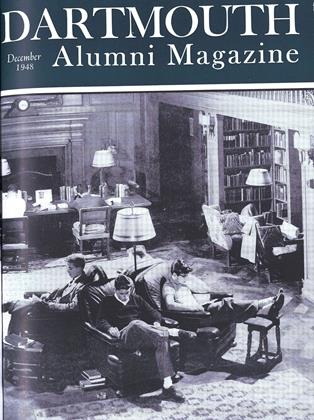ON SOME HISTORIC but now indefinite date in recent months the ALUMNI MAGAZINE missed a golden opportunity. Quietly, like a new cell becoming part of a strong and growing body, the one-hundredth Dartmouth alumni club was formed—an event deserving of Indian yells and a 36-point headline at the very least.
We were led to make a tally of Dartmouth's alumni clubs and associations when the newest of them, the Dartmouth Club of the North Country, was established in October in the College's own backyard. The total came to 103, and the fact that this was a numerical surprise served rather graphically to indicate the rapid rate at which Dartmouth's network of clubs has been spreading since the war. Newcomers stretch from Shanghai and Tokyo in the Far East to Winter Park in Florida and now to the North Country of.. New Hampshire and Vermont. At many points in between, not only have other new clubs come into being within the past three or four years, but the active membership and the programs of established clubs have grown on an unprecedented scale.
There is no pin-point reason for all this. The social urge is always a big factor in the formal organization of a new alumni group, and good fellowship is the cement that holds a club together; but perhaps the most important reason for the growth of alumni clubs is the fact that they have progressed so far beyond a purely social status, in response to the needs of the College. The variety of activities in which a lively, well-organized club engages is impressive.
In the present flood of applications for admission to Dartmouth, the alumni clubs are doing yeoman service through their interviewing committees, making a difficult problem a lot less difficult than it would be without their willingness to shoulder the extra work required to keep the Selective Process functioning as it should. And at the same time, the school committees of Dartmouth clubs are awarding local achievement prizes and are working enthusiastically to get more and better applicants, on the sound theory that the College can never reach a saturation point in undergraduate quality.
The regional scholarship funds and loan funds which the alumni clubs are establishing and augmenting are doubly important, in helping to meet the growing need for financial aid among undergraduates and in serving, after the fashion of national scholarships, to attract highly qualified men of limited means from all sections of the country. This is one of the points at which the regional basis on which alumni clubs operate is of such benefit to the College. Two other such points are the alumni vocational program and the College's new public relations program, in which the alumni clubs are counted upon to serve as publicity agents and to provide the "local angle" which would otherwise be lacking.
Beyond all these activities of direct College benefit, the Dartmouth clubs in many cities are taking part in community enterprises and are thus adding to the good repute of Dartmouth men. Programs featuring local guest speakers and this past year's inauguration of a traveling Hanover Holiday indicate that the alumni clubs might very well emerge as educational influences too.
The class traditionally and in practical, tested operation has always been the focus of Dartmouth's alumni organization. There is no reason to believe that this will change. The remarkable growth on the club side supplements rather than supplants the traditional class role. To the associations which Dartmouth men have long enjoyed with classmates and college contemporaries is added the opportunity to meet socially and to work with Dartmouth men of all classes on a regional basis. Young graduates are prominent in the present development of club activities, and this promises much for the future. The first hundred Dartmouth clubs have been the hardest; as they grow better and new clubs join them, more power to all. Dartmouth today is a stronger and better college because of what the clubs are adding to the well-established and indispensable class activities.
 View Full Issue
View Full Issue
More From This Issue
-
 Article
ArticleCancer Pain Reduced Through His Research
December 1948 By JOHN HURD '21 -
 Article
ArticleDeaths
December 1948 -
 Lettter from the Editor
Lettter from the EditorLetter From Paris
December 1948 By WILLIAM I. ZEITUNG '43 -
 Class Notes
Class Notes1918
December 1948 By ERNEST H. EARLEY, DONALD L. BARR, DAVID L. GARRATT -
 Class Notes
Class Notes1939
December 1948 By RICHARD S. JACKSON, GEORGE R. HANNA -
 Class Notes
Class Notes1931
December 1948 By A. W. LAUGHTON, WILLIAM H. SCHULDENFREI, CHARLES S. MCALLISTER







